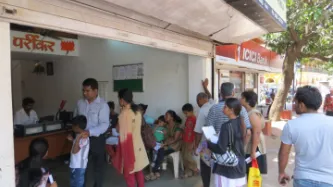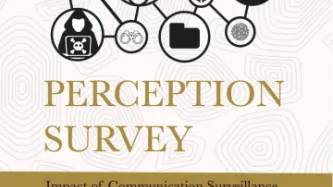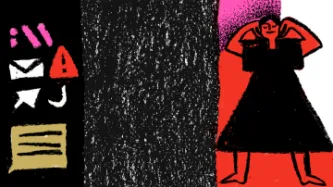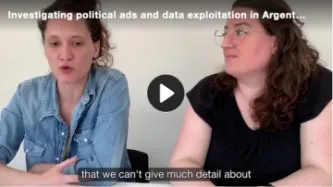Search
Content type: Examples
After Uber refused requests to adjust prices following a rise in the cost of fuel, Kenya's Organisation of Online Drivers union of about 15,000 began circulating its own chart listing fares about 50% higher than Uber's official prices. Members using it are prioritising customers who pay by cash or M-Pesa and turn down customers who want to pay using Uber's app. As the rate card has become more familiar, customers are showing less resistance to these new driver-set prices. Uber says the…
Content type: Examples
A former TikTok moderator in Kenya has threatened a lawsuit against TikTok's owner, ByteDance, alleging that he has developed PTSD as a result of his work for the company and that he was unfairly dismissed for advocating for better working conditions. In a letter, his lawyer alleges that the job required him to watch 250 to 350 videos per hour, the vast majority of them "horrific in nature".https://time.com/6293271/tiktok-bytedance-kenya-moderator-lawsuit/ Publication: Time MagazineWriter…
Content type: Examples
The Argentinian startup Nippy offers delivery drivers access to rest stops including free coffee, phone charging stations, and toilets in return for downloading its app and allowing it to sell the data the app collects to partners in insurance, financial services, and telecommunications. The result is to give companies like Mastercard and Movistar insight into gig workers' income in the areas where Nippy operates in Argentina, Mexico, and the Dominican Republic. The services Nippy's rest stops…
Content type: Examples
Behind every powerful AI system are huge numbers of people labelling and clarifying data to train it, contracted by companies like Remotasks, a subsidiary of Silicon Valley-based data vendor Scale AI, whose customers include the US military and OpenAI. Often the workers, who are assigned tasks they don't understand for a purpose they don't know, are sworn to secrecy. Yet labelling is crucial; it can make the difference between a car stopping to spare the person walking a bike across the road or…
Content type: Examples
More than 150 workers employed by third-party outsourcing companies to provide content moderation for AI tools on Facebook, TikTok, and ChatGPT depend have pledged to create the African Content Moderators Union. The move to create such a union began in 2019 when the outsourcing company Sama fired Facebook content moderator Daniel Motaung for trying to form a union. https://time.com/6275995/chatgpt-facebook-african-workers-union/Publication: TimePublication date: 2023-05-01Writer: Billy…
Content type: Examples
Four people in Kenya have filed a petition calling on the government to investigate conditions for contractors reviewing the content used to train large language models such as OpenAI's ChatGPT. They allege that these are exploitative and have left some former contractors traumatized. The petition relates to a contract between OpenAI and data annotation services company Sama. Content moderation is necessary because LLM algorithms must be trained to recognise prompts that would generate harmful…
Content type: Advocacy
Privacy International responded to the consultation on the proposed data protection bill (the "Bill") to reform the current law 25.326
We welcome the continued efforts by Argentina to provide protections for the right to privacy, already enshrined in the Constitution of Argentina. PI welcomes the main objective of the Bill, namely to regulate the processing of personal data in order to guarantee fully the exercise of data subjects’ rights in accordance with Article 43 of the Constitution (…
Content type: News & Analysis
In a ruling handed down on 14 October 2021 by the High Court of Kenya in relation to an application filed by Katiba Institute calling for a halt to the rollout of the Huduma card in the absence of a data impact assessment, the Kenyan High Court found that the Data Protection Act applied retrospectively.
Background to the case
Huduma Namba as initially proposed
In January 2019, the Kenyan Statute Law (Miscellaneous Amendment) Act No. 18 of 2018 came into effect, introducing a raft of amendments…
Content type: Long Read
This piece was last updated in June 2021.
In many countries, access to social protection (such as welfare programmes or healthcare) is made conditional on producing a form of identification (“ID”). But obtaining a recognised and accurate ID is often a process riddled with discriminatory designs, bureaucracy and technical failures that prevent individuals from accessing the services they are entitled to. Even when people eventually get an ID, it might not accurately reflect who they are,…
Content type: Report
Human rights defenders across the world have been facing increasing threats and harms as result of the use of digital and technological tools used by governments and companies which enable the surveillance, monitoring and tracking of individuals and communities. They are continuously at risk of violence, intimidation and surveillance as a direct consequence of the work they do. Such surveillance has been shown to lead to arbitrary detention, sometimes to torture and possibly to extrajudicial…
Content type: Video
You can listen and subscribe to the podcast where ever you normally find your podcasts:
Spotify
Apple podcasts
Google podcasts
Castbox
Overcast
Pocket Casts
Peertube
Youtube
Stitcher
And more...
And support PI's work here: support.privacyinternational.org
Content type: Examples
Kenya’s Independent Policing Oversight Body reports that it received 87 complaints covering 31 incidents in which injuries were linked to the actions of police officers and 15 deaths between curfew’s imposition on March 27 and June 5. In April, Human Rights Watch accused the police of brutality in imposing the curfew from the beginning, including whipping, kicking, and teargassing people.
Publication: Guardian
Publication date: 2020-06-05
Content type: Video
The incorporation of new technologies to electoral processes is a phenomenon with a global and exponential growth. Despite its benefits, online campaigning is not without challenges, and can pose threats to transparency and equity in electoral competition. Given the role of elections as foundational pillars of the democratic system and a key gateway for the exercise of fundamental civil rights, these implications must be assessed with care and through specific tools.
We at PI, together…
Content type: Video
You can find out more about Haki na Sheria here: http://hakinasheria.org/
Find out more about double registration in Keren's piece "In Kenya, thousands left in limbo without ID cards" in CodaStory: https://www.codastory.com/authoritarian-tech/kenya-biometrics-double-registration/
Find out more about the Huduma Namba case on our website: https://privacyinternational.org/news-analysis/3350/why-huduma-namba-ruling-matters-future-digital-id-and-not-just-kenya
You can listen and…
Content type: Examples
From our partners from the Defenders Coalition: The civil society’s Police Reforms Working Group, comprised of twenty national human rights organisations, condemn the unnecessary and excessive use of force by Kenya Police Service officers yesterday at the Likoni Ferry Crossing, Mombasa. The police actions completely betrayed the specific responsibility bestowed upon them by the President; to facilitate orderly passage of commuters on the Likoni crossing.
Link to their reaction: https://…
Content type: Case Study
The run up to Kenya’s 2017 elections was extremely tense. Kenya has a history of violently fought elections and there was fear this election would be no different. It was in this tense environment, that companies like Cambridge Analytica and Harris Media – and their digital offerings - got involved in the election campaigns.
Cambridge Analytica’s business model is by now familiar, they compiled a huge amount of data points, often through illegal means, to create profiles on individuals –…
Content type: Examples
In order to enforce mandatory 14-day quarantine orders, Kenyan authorities have been tracking mobile phones of people suspected to have COVID-19. Also in Kenya, police enforcement efforts have led to several deaths: three died of injuries from being beaten, one, a 13-year-old boy, was hit by a bullet.
Source: https://www.bbc.co.uk/news/world-africa-52214740
Writer: Dickens Olewe
Publication: BBC News
Content type: Examples
The former Big Brother reality TV star Matías Schrank was arrested by the Cybercrime division of the Misiones provincial police, after publishing tweets that claimed that Eduardo Rovira, the president of the Misiones legislature, had contracted COVID-19 on his recent trip to Thailand and was reckless in not immediately going into quarantine but continuing to hold meetings with other high-level government officials. Schrank was charged under Article. 211 of the Criminal Code, which…
Content type: Examples
The Argentinian company Urbetrack is developing a "Cuidate en casa" (Take Care of Yourself at Home) app that it will pitch to government agencies throughout the country. The goal is to contribute to remediating the health crisis by helping enforce quarantine. The plan is that users will download the app and complete a form with their personal details as chosen by the local authority. The app will then generate a "radial geofence" defined by the local authority, within which the user must stay.…
Content type: Examples
The Argentinian Ministry of Transport, working with the state-owned satellite company ARSAT and the telecoms regulator,ENACOM, proposed to the Executive on 31 March 2020 a platform that uses cell tower data to track people on public transport and ensure they comply with quarantine laws. By 28 March, the Ministry of Security had detained 13,006 people for violating the rules. The government believes that although compliance is high, it will deteriorate if quarantine is extended much longer…
Content type: Examples
The San Francisco-based big data company Grandata has created a heat map to show which areas of Argentina are best complying with the quarantine lockdown. Grandata used an "anonymised" dataset collected from apps that provide third parties with geolocation information. The heat map shows if an individual has moved more than 100 meters from the place where they spend most of their time, apparently without taking into account the socio-economic contexts of different cities, where individuals…
Content type: Examples
Argentina's Public Prosecutor's Office will start installing an app on the smartphones of those who violate government-ordered quarantine in the cities of Santa Fé and Rosario. The app will be installed by the province's Criminal Investigation Agency to track those who are under criminal investigation for violating quarantine. The app will send reports to the the MPA investigation office and coordinated by the Attorney General's Office. Individuals will be required to sign a document…
Content type: Examples
On March 23, Argentina's immigration agency, Dirección Nacional de Migraciones (DNM), announced that anyone arriving in the country would be required to install the free COVID-19 Ministry of Health app on their phone for 14 days to ensure they comply with quarantine rules in order to protect the population. The Office of the Chief of Staff had instructed the DNM to adopt this policy when it launched the app, also on March 23. Since launch, the number of unnecessary permissions the app requests…
Content type: Examples
The self-testing web app issued by Argentina's Secretariat of Public Innovation asks for national ID number, email and phone as mandatory fields in order to submit the test. The Android version requires numerous permissions: calendar, contacts, geolocation data (both network-based and GPS), microphone, camera, full network access; change audio settings, run at startup; draw over other apps, prevent device from sleeping.
Sources:
https://www.argentina.gob.ar/coronavirus/app
https://play.…
Content type: Examples
The free app Testeate, developed by the company Adrómeda in collaboration with the Association of Information and Communication Technologies of Mar del Plata (ATICMA) and the Chamber of Software and Computer Services Companies of Argentina (CESSI) and launched in the Municipality of General Pueyrredón on March 26, is intended to enable direct information exchange between Argentina's National Ministry of Health and the population by offering constantly updated information in any city and…
Content type: Examples
A group of independent developers in Argentina started CoTrack, a public crowdsourced effort to develop an app to track and slow the spread of the virus. CoTrack registers each user's geographic movements and looks for times when they are close to people who have been diagnosed with COVID-19. When there is a confirmed case, a user who has the app can share their data with the community so others can automatically be notified that they should take precautions. The Ministry of Health for the area…
Content type: Examples
An Argentinian crowdsourcing website is collecting information on flights with passengers who were reported as testing positive for COVID-19. Users are asked to enter their email address and the date, airline, and flight number, and tick a box to indicate that someone on their flight was infected. No information is provided on who operates the site, but the terms and conditions indicate that it uses open data flows alongside the collected data.
Source: http://www.checkmyvirusrisk.com/CO/…
Content type: Long Read
Background
Kenya’s National Integrated Identity Management Scheme (NIIMS) is a biometric database of the Kenyan population, that will eventually be used to give every person in the country a unique “Huduma Namba” for accessing services. This system has the aim of being the “single point of truth”, a biometric population register of every citizen and resident in the country, that then links to multiple databases across government and, potentially, the private sector.
NIIMS was introduced…
Content type: News & Analysis
On 30 January 2020, Kenya’s High Court handed down its judgment on the validity of the implementation of the National Integrated Identity Management System (NIIMS), known as the Huduma Namba. Privacy International submitted an expert witness testimony in the case. We await the final text of the judgment, but the summaries presented by the judges in Court outline the key findings of the Court. Whilst there is much there that is disappointing, the Court found that the implementation of NIIMS…
Content type: Advocacy
We welcome the effort by the Government of Kenya to give life to and specify the right to privacy, already enshrined in Article 31(c) and (d) of the Constitution of Kenya by proposing a draft Data Protection Act. We particularly appreciate the direct reference to this Constitutional right in the purpose of the Act and the way it is referred to on several occasions in the Act.
While these efforts have positive intentions and we are pleased that Kenya has adopted a comprehensive data protection…









